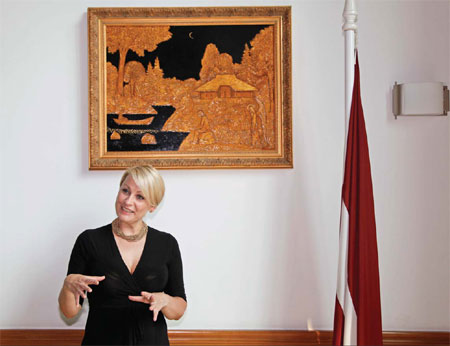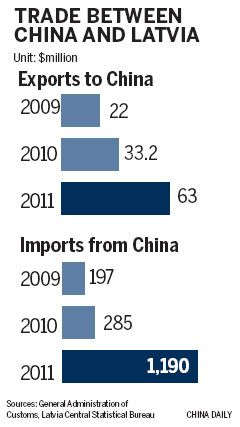Latvia spruces up to woo big business
Updated: 2012-08-03 11:09
By Zhao Yanrong (China Daily)
|
|||||||||||
|
Ieva Jakobsone, counselor of economic and commercial affairs at the Latvian embassy, expects increasing interest from Chinese business. Kuang Linhua / China Daily |
Plucky baltic state eyes new silk road trade with China
As host country of the Global China Business Meeting 2012 in November, Latvia is taking the opportunity to make itself more attractive to the world's second-largest economy.
|
|
Ieva Jakobsone, counselor of economic and commercial affairs at the Latvian embassy in Beijing, says that the Baltic country, with its advantageous geographic position, good logistics and transport network, and sufficient human resources, can be a springboard for Chinese companies to enter the bigger European market.
"In 2011 about 5 percent of total foreign direct investment inquiries in Latvia came from China, but we expect interest from Chinese business groups will increase quickly in the near future," Jakobsone says.
Trade between China and Latvia was worth $1.26 billion (1.04 billion euros) last year, an increase of 50.7 percent on the previous year, according to the China General Administration of Customs. China imported goods worth $63 million from Latvia, up 64.5 percent on the previous year, and exported goods worth $1.19 billion, up 50 percent on the previous year, giving China a trade surplus of $1.13 billion.
In July last year, Huawei Technologies Co Ltd, China's leading telecom infrastructure provider, won the bid to upgrade Latvia's mobile communication network with a contract worth $9 million. The construction of Huawei's research and development center in Latvia is under negotiation.
However, compared with China's trade volume with the European Union as a whole, Latvia does not have a significant market share.
About 136.2 billion euros of EU goods were exported to China last year, while 292.5 billion euros of Chinese products were imported by the EU.
China is now the EU's second trading partner behind the United States, and the EU's biggest source of imports by far. The EU is also China's biggest trading partner.
The annual Global China Business Meeting aims to bring together the highest-level entrepreneurs from China and around the world. Previous meetings have taken place in Geneva, Frankfurt, Barcelona, Lisbon, Luxemburg and Valencia, and each time attracted about 400 high-level officials and business representatives.
"China has a very close trade relationship with the EU, but mainly with the leading economies, not the small members like Latvia," Jakobsone says. "We hear of China quite often but we are in an early development of understanding the Chinese and their market. To find more cooperation opportunities, we need more business events and communication, such as the annual business meeting."
At the end of April, on her way back to Beijing, Jakobsone stopped in Warsaw to attend the Central Europe-China Economic Forum and chair discussions on trade between the region and China.
The forum coincided with Chinese Premier Wen Jiabao's official visit to Poland. As many as 12 measures involving co-operation between Central and Eastern European countries and China were outlined at the forum.
During the meeting with his Latvian counterpart, Valdis Dombrovskis, Wen encouraged Chinese enterprises to invest in Latvia, and said he hoped the Baltic state could offer assistance to Chinese investment, Xinhua News Agency reported. Wen said China attached importance to its cooperation with Latvia in transport and logistics, which improved traffic flow between Europe and Asia, according to Xinhua.
"I sense the common denominator for all participants was the understanding that this was the beginning of exploring business opportunities in the regions," says Jakobsone, who also heads the representative office of the Latvian investment and development agency in China.
As a small economy, Latvia realizes the importance of attracting foreign investment to sustain economic development. The main foreign investors in Latvia are the strong alliance of Scandinavian countries and Britain and Germany.
According to Jakobsone, sectors such as transport and logistics, information and communication technologies, and mechanical engineering and electronics are the interesting sectors for Chinese investors.
"Being the closest EU border to China and having just one neighbor, Russia, in between makes Latvia an attractive and trustable partner for Chinese businesses in the EU," she says.
The transcontinental route via Urumqi in China, Kazakhstan, Russia and Latvia - the so-called New Silk Road - provides opportunities for Chinese companies to gain access Scandinavian and Central European markets in less than 15 days.
"I see this as a fantastic business proposition for Chinese logistics companies and manufacturers to establish their assembly and distribution facilities in Latvia, taking advantage of the geographical location of the country, the tax incentives and customs services provided by the free ports of Latvia, which, by the way, are highly recognized by the international community."
The embassy in Beijing points out that, according to a PricewaterhouseCoopers and World Bank 2012 study, Latvia has only seven company tax payments, ranking it 11th alongside China in the tax payments rank out of 183 countries. By comparison, Germany requires 12 tax payments and ranks 44th.
Four special economic zones in Latvia, three of which are free ports, provide tax breaks to investors. A special corporate income tax refund for large-scale investment projects has been introduced by the government this year.
Regarding the European debt crisis, Latvia seems to maintain a positive attitude toward the EU and the future of the euro.
"I see the European Union as an instrument to safeguard smaller countries like Latvia," Jakobsone says. "It is in the interests of the Latvian people to rebuild the trust and respect for all European economies, working together and finding solutions for the common prosperity of the EU in the future. It is in Latvia's interests to have a sustainable and safe European currency, with the euro expected to be introduced in Latvia in 2014."
The country's unit of currency is the lat, equivalent to 0.7 euros.
Latvia has been praised by high-profile figures for its economic record in responding to the European crisis.
According to the Financial Times, US Secretary of State Hillary Clinton said the Baltic state was taking "very difficult" austerity measures that would ensure a "stable, prosperous future". And the IMF Managing Director, Christine Lagarde, proclaimed its austerity program an "inspiration" to heavily indebted eurozone countries.
"To set oneself an austerity framework requires a lot of strength and a long-term vision of prosperity, but I do not see any other way for the European countries to rectify the financial and economic issues and stay competitive in the world market," Jakobsone says.
zhaoyanrong@chinadaily.com.cn
(China Daily 08/03/2012 page21)
Today's Top News
Rescuers race against time for quake victims
Telecom workers restore links
Coal mine blast kills 18 in Jilin
Intl scholarship puts China on the map
More bird flu patients discharged
Gold loses sheen, but still a safe bet
US 'turns blind eye to human rights'
Telecom workers restore links
Hot Topics
Lunar probe , China growth forecasts, Emission rules get tougher, China seen through 'colored lens', International board,
Editor's Picks

|

|

|

|

|

|







